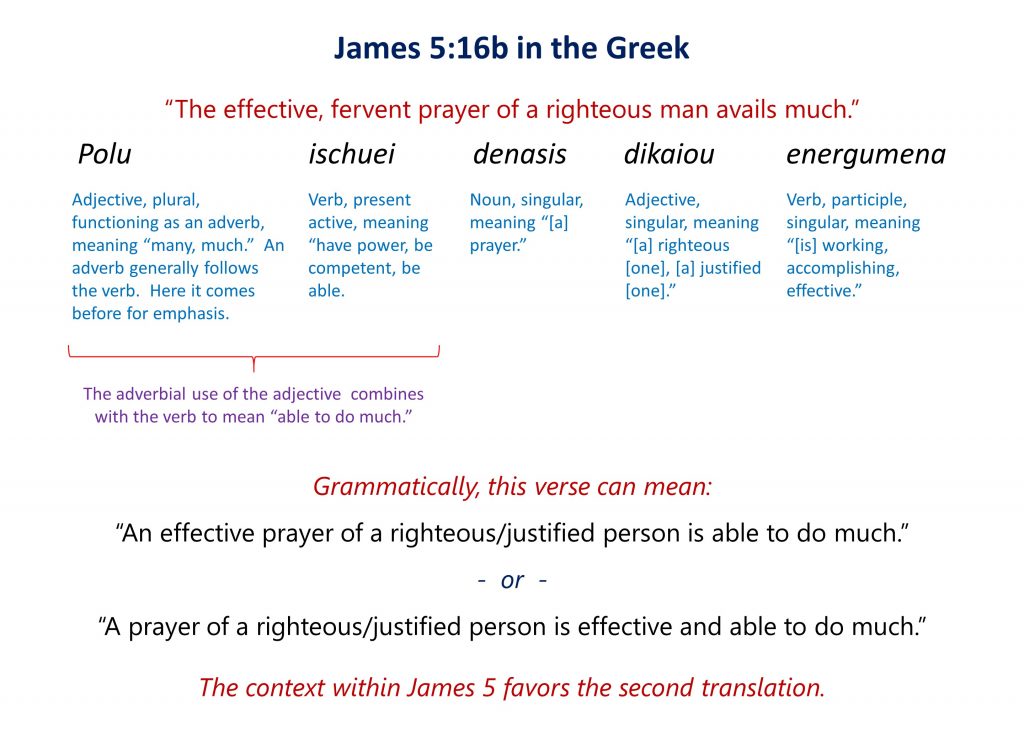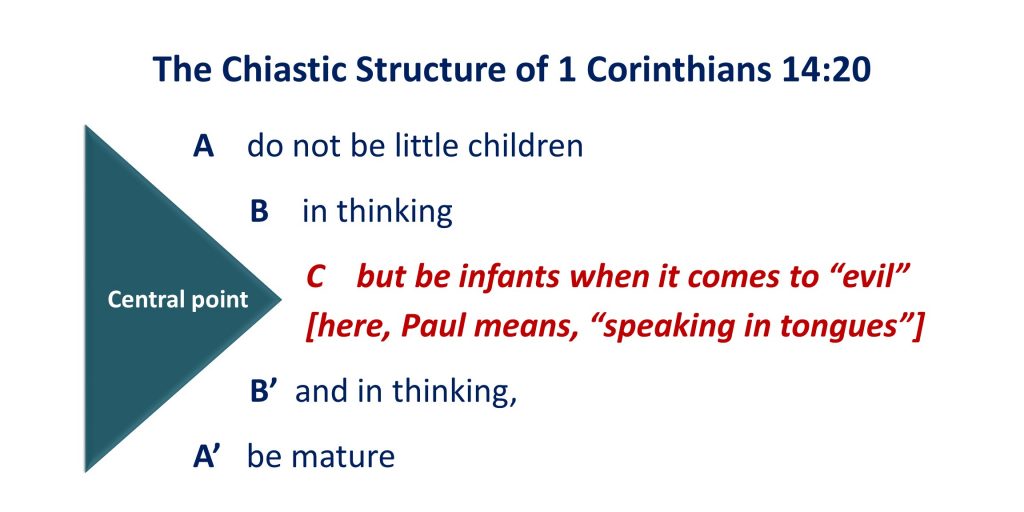 We now look further into prayer, looking at specific verses that help shape our life of prayer.
We now look further into prayer, looking at specific verses that help shape our life of prayer.
Fervent Prayer
The traditional wording of James 5:16 is this: “The effective, fervent prayer of a righteous man avails much.” This has fostered in some that if your prayer isn’t fervent enough (with intensity, with genuine heart-felt passion), your prayer won’t be effective and, thus, God won’t answer it. To help us understand what James was saying, we’ll look at this verse in the original Greek.
- What word is included in the traditional form of this verse that is not in the original?
- Does the fervent nature of a prayer have anything to do whether it is effective or not?
- Who makes someone “righteous” of “justified”?
- What is the connection between a person being righteous/justified and his prayer being effective and able to do much?
Praying in Unintelligible Utterances
The church in Corinth had a problem with people “speaking in tongues” (unintelligible utterances) during worship. This caused disruptions. But even more, many in that congregation considered such speaking to be the best spiritual gift to have.
So, 1 Corinthians 12:27-31, Paul decides to move from the greater to the lesser to put “speaking in tongues” in its proper place.
Read 1 Corinthians 12:27-32
After the chapter on love (1 Corinthians 13), Paul again dealt with speaking in tongues.
Read 1 Corinthians 14:18-20
- In vs. 19, what is Paul doing concerning “unintelligible utterances” during worship?
- In vs. 20, based on the subject matter in this section, what is the “evil” to which Paul refers?
Read 1 Corinthians 14:21-22
- In verse 21, how and to whom is God speaking?
- Despite that, what is the result?
Yet, Paul does not “forbid” speaking in tongues (1 Corinthians 14:29), but he establishes criteria for that to happen in a godly way. If speaking in tongues is to happen, the person speaking is only to do so if someone is there to interpret (1 Corinthians 14:27). This is the crux: Someone will not know ahead of time (without collusion) if another will be present to “interpret”!
With such a strong censure against “speaking in tongues” during worship, Paul still said: “I thank God that I speak in tongues more than all of you.” When was this speaking then done? Paul wrote that the person “speaking in tongues” is to “speak to himself and to God” (1 Corinthians 14:28)—private prayer.
Paul only gives us one clue as to what his “speaking in tongues” was like.
Read Romans 8:26-27
- What was Paul’s speaking in tongues?
- What is the context for Paul’s “groanings”? (Romans 8:18)
- Did Paul much where he would have many opportunities to “groan” to God? (2 Corinthians 11:23-27)
Invocation of the Saints
Some in the Church today call to those in eternity to pray for them. This is sometimes called “praying” to the saints in heaven. Since we Lutherans reserve the word “prayer” only for God, calling on or invoking the saints in eternity is a better way to understand their practice.
As Lutherans, our Smacald Articles say, “The invocation of the saints in also one of the abuses of the Antichrist [meaning, the Pope]” (SA 2, 25). Why did we say that? Here’s why. Rome taught:
- The Christians on earth must invoke (call on) the saints who have departed this life.
- Why? The Christians on earth are unworthy of being heard by God because of their sins, so the saints in heaven become their advocates and patrons.
- Because Christians are deficient in suitable good works, they invoke the saints so they may apply and credit their merits to the Christians on earth. The saints on in heaven have more merits than they need, so they can apply their merits to the Christians on earth.
Here is what the Catechism of the Catholic Church teaches:
Being more closely united to Christ, those who dwell in heaven fix the whole Church more firmly in holiness.… They do not cease to intercede with the Father for us, as they proffer the merits which they acquired on earth through the one mediator between God and men, Christ Jesus.… So by their fraternal concern is our weakness greatly helped. [Section 956, emphasis mine]
Rome condemned the Lutheran Church because we did not require invocation of the saints. We responded in our Apology [defense] and said that this is as far as we can take our argument: “Scripture does not teach the invocation of the Saints or that we are to ask the saints to help us” (Ap XXI, 10). Our Confessions do not require us to “invoke” the saints. Yet, nowhere does the Word of God or our Lutheran Confessions forbid the invocation of the saints.
To help us understand this “middle ground” of Lutheranism, this example from our Smalcald Articles may help us understand this better:
For as a Christian and saint upon the earth you can pray for me, not only in one, but in many needs. But for this reason I am not obliged to adore and invoke you, and celebrate festivals, fast, make oblations, hold masses for your honor, and put my faith in you for my salvation. [SA 2, 27]
Someone can go to another Christian (here on earth) and have that person intercede for him in an idolatrous way. We forbid this because it takes away from Christ. If someone were to call on the saints in eternity in such an idolatrous way, we would also forbid that. But if someone does that in a benign way, we allow that. We don’t, however, teach this practice because we don’t know if “the saints hear the prayers of individuals?” (Ap, XXI, 10).





